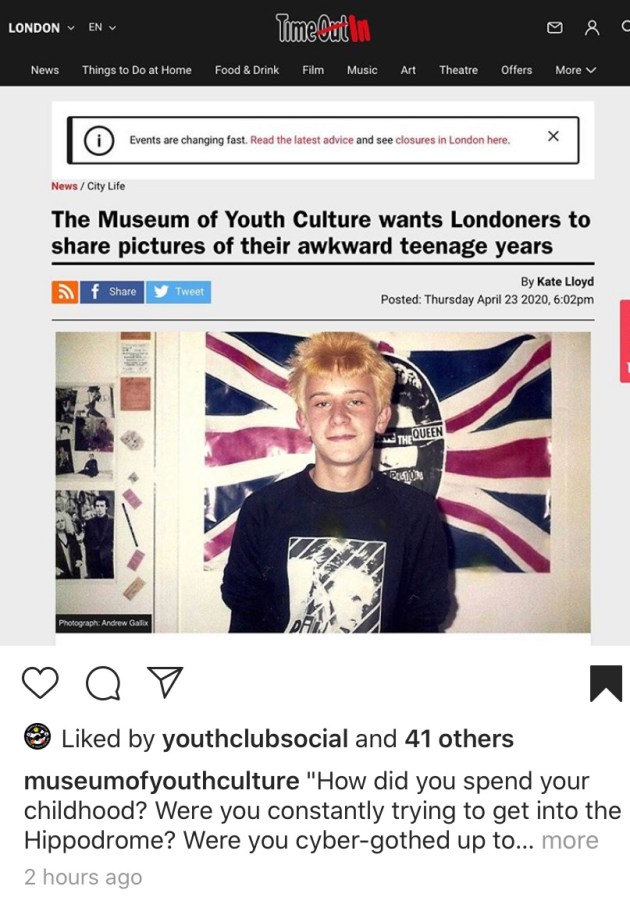![]()
Paris, 1980.
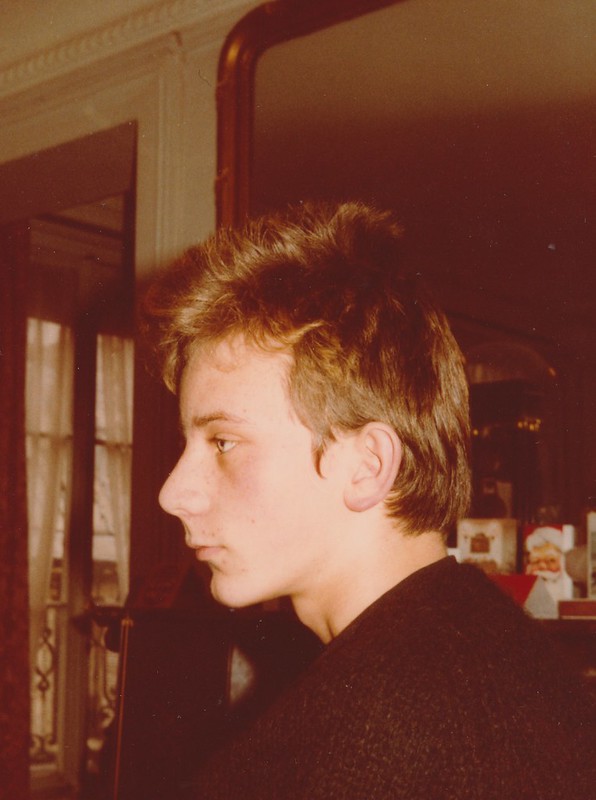
![]()
Me (left) and friend (back in 1981) on The Times website, as part of a series of pictures from the Museum of Youth Culture’s Grown Up in Britain coffee table book. It was posted on 16 September 2021.
![]()
Me (left) and friend (back in 1981) on the Fred Perry website, illustrating a piece advertising the Museum of Youth Culture’s limited-edition Grown Up in Britain coffee table book.
![]()
Northern Monk in conjunction with British Youth Culture have used a picture of me and my stepfather, Allen Jessop — taken by my late mother on holiday in Jersey, back in July 1981 — to illustrate a beer called Holidays in the Sun. It came out at the end of last year.


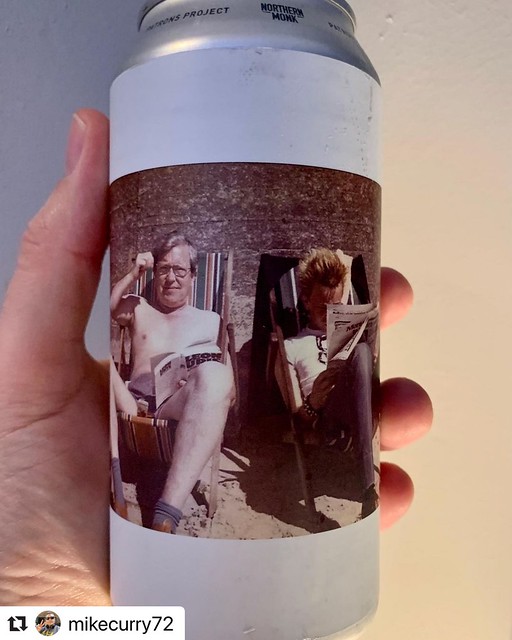
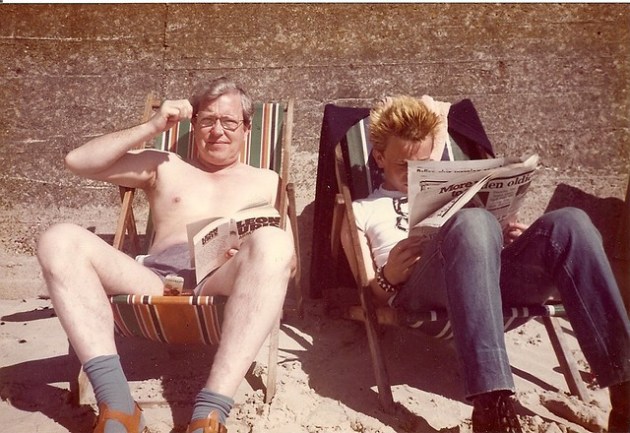
![]()
My tribute to the late Marc Zermati in the Guardian, 17 June 2020:
Marc Zermati: Farewell to the ‘Hippest Man in Paris’
Zermati, who has died aged 74, was an anglophile dandy whose label Skydog crash-landed rock’n’roll into conservative France
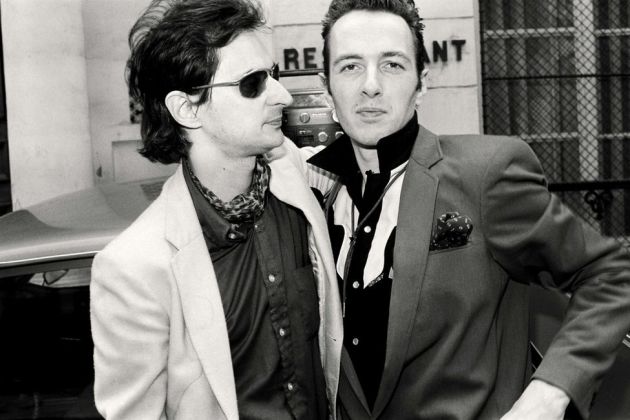
Marc Zermati with the Clash’s Joe Strummer. Photograph by Catherine Faux (Dalle/Avalon.red)
Marc Zermati, who died of a heart attack on Saturday at the age of 74, was a true underground legend: a national treasure France had never heard of and probably did not deserve. Rock Is My Life — the title of a 2008 exhibition celebrating his career on the radical fringes of the music business — would serve as a fitting epitaph.
Skydog, which Zermati co-created with Pieter Meulenbrock in 1972, was the first modern indie label, directly inspiring the launch of Chiswick and Stiff in England — its most successful release was the Stooges’ Metallic KO in 1976. As a promoter Zermati organised the world’s first punk festival, at Mont-de-Marsan, and introduced bands such as the Clash to a French audience. His heroin addiction and wheeler-dealing landed him on the wrong side of the law, and in latter years his curmudgeonly rightwing views alienated many people. But as one of the earliest champions of punk his importance in rock history cannot be overstated; if cut, he would have bled vinyl.
Zermati was born into a family of Sepharadi Jews in Algiers. Growing up against the bloody background of the war of independence, he took refuge in rock’n’roll records imported from the US, which were more readily available — as he often boasted — than in metropolitan France.
Like so many other pieds-noirs (the name given to people of European origin born in Algeria under French rule) the family fled to la métropole in 1962, when the country gained independence. Zermati would always entertain a conflicted relationship with his new homeland, which he deemed backward-looking and inimical to youth culture. Lest we forget, the 1968 student uprising was sparked off by a protest against single-sex halls of residence at Nanterre — France, at the time, was not all nouvelle vague flair and post-structuralists zooming around in sleek Citröens.
It was in fact often very conservative — socially and culturally — and pop music from the US or the UK was frequently met with xenophobic contempt. In interviews, Zermati recalled how the police would constantly harass, and sometimes even arrest him on account of his long hair, and how he would escape to London, where he felt free, as often as possible. In recent years he bemoaned the “Toubon law”, introduced in 1996 to compel radio stations to play at least 40% francophone songs, singling it out as yet another instance of Gallic insularity — further proof that France and authentic rock music were incompatible.
It was not all bad, though. He joined the ranks of the fabled Bande du Drugstore, fashion-conscious members of Paris’s jeunesse dorée who hung out on the Champs-Elysées and were notorious for their hard partying (referenced by Jacques Dutronc on his 1966 hit “Les Play Boys”). These minets, as they were mockingly called, had a great deal of influence on the mod look across the Channel. This week, journalist Nick Kent wrote on his Facebook page that when he first met Zermati, in 1972 (when the New York Dolls were in town with their future manager, Malcolm McLaren), he was the “hippest man in Paris bar none”. Along with Yves Adrien, Patrick Eudeline, Alain Pacadis and a few others, Zermati — whose idea it was to dress the Flamin’ Groovies in sharp Fab Four suits — belonged to a typically French line of anglophile dandies, who would go on to shape the punk and post-punk years.
In the mid-60s Zermati worked in an art gallery in Saint-Germain-des-Prés where he rubbed shoulders with Joan Miró and Henri Michaux, and befriended Max Ernst — the German surrealist encouraged him to explore the burgeoning American counterculture. His first taste of LSD (in Ibiza, where he stayed for a year) was a turning point in his life, and he always claimed to be able to tell people who had experienced its mind-expanding properties from those who had not, however cool they attempted to appear. L’Open Market, the record emporium he opened in 1972 was originally a head shop, where people congregated to peruse the international underground press and smoke dope. The records on sale were few but carefully selected, and it was this loving curation that outlined a rival tradition, bypassing the progressive cul-de-sac and leading straight to punk. Kids who came in asking for the latest Yes or Genesis were shown the door unceremoniously. Lester Bangs, Lenny Kaye, Jon Savage, Chrissie Hynde, Malcolm McLaren and all the local punks-to-be ranked among the customers. Nico could often be found cooking in the apartment above the shop, while bands such as Asphalt Jungle would be rehearsing in the basement.
Zermati’s taste in music, as well as clothes, was always impeccable. The first release on his label was a wild jam session between Jim Morrison, Johnny Winter and Jimi Hendrix (whom he had met in London and venerated), followed by the Flamin’ Groovies’ legendary Grease EP. You would be hard pressed to start on a higher note. As early as 1974, he set up the first independent distribution network in partnership with Larry Debay; alongside the two Mont-de-Marsan festivals, he organised three nocturnal punk gigs at Paris’s Palais des Glaces in April 1977, with an unbeatable lineup featuring the Clash, the Damned, Generation X, the Jam, the Stranglers, Stinky Toys and the Police (still with their French guitarist, Henry Padovani). At one stage in the 80s, he even became the Clash’s de facto manager.
Following a spell in prison, he co-launched another label, Underdog, and went on to promote gigs in Japan (where he took Johnny Thunders). His greatest achievement, however, will always be transforming Paris, for a few short years in the run-up to punk, into what felt like the capital city of the rock world.
![]()
I have written a piece in homage to the late Marc Zermati for the Guardian. Great photo by Catherine Faux of Zermati with Joe Strummer in Paris back in 1981.

Marc Zermati, who died of a heart attack on Saturday at the age of 74, was a true underground legend: a national treasure France had never heard of and probably did not deserve. Rock Is My Life — the title of a 2008 exhibition celebrating his career on the radical fringes of the music business — would serve as a fitting epitaph. . . . [A]s one of the earliest champions of punk his importance in rock history cannot be overstated; if cut, he would have bled vinyl…
![]()
A picture of me (left) and Yannick from 1981 used to illustrate the “British Anarchy” section of Bill Osgerby‘s “The Teenage Revolution” on the Museum of Youth Culture‘s website, April 2020.


![]()
A picture of me and my stepdad on holiday in Jersey, July 1981:
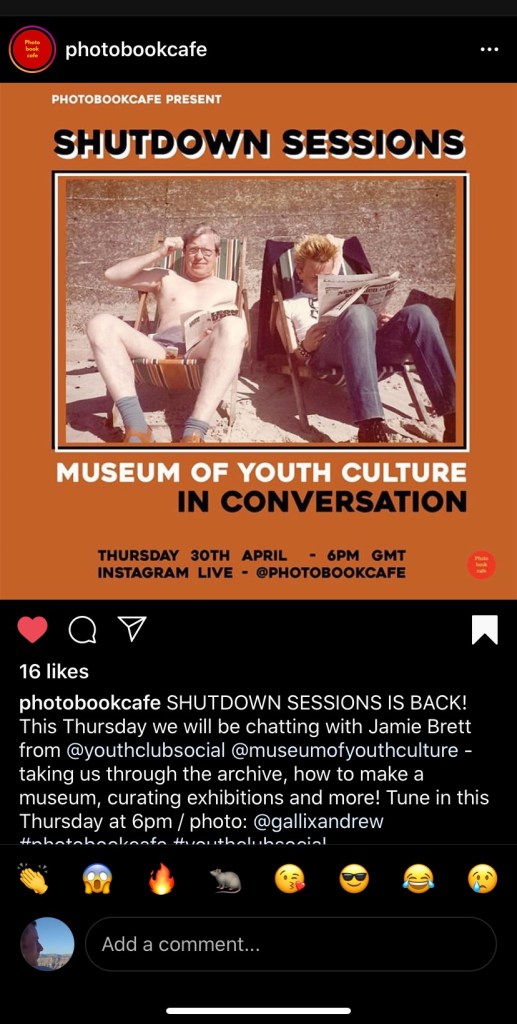
![]()
Lloyd, Katie. “The Museum of Youth Culture Wants Londoners to Share Pictures of their Awkward Teenage Years.” Time Out, 23 April 2020:
